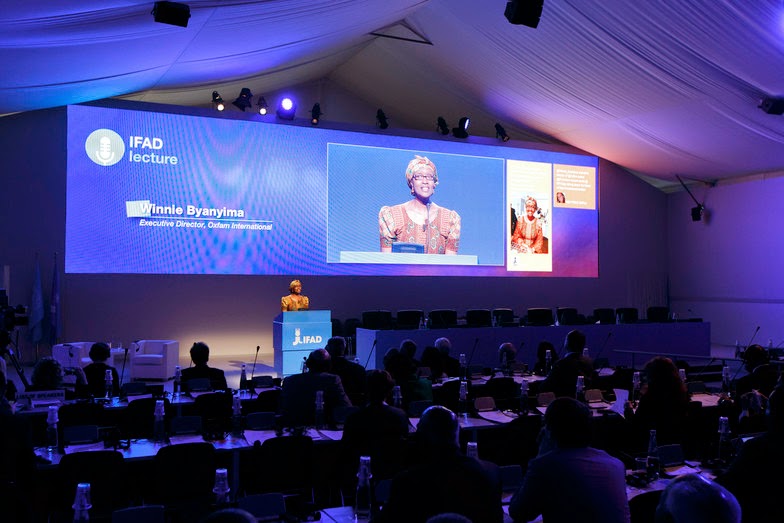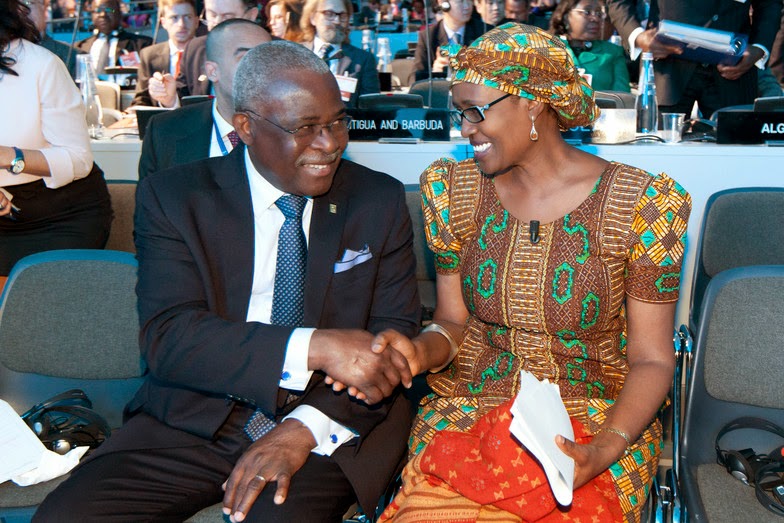 Winnie Byanyima, Executive Director Oxfam International, gave the inaugural IFAD Lecture at the recent38th session of the Governing Council, IFAD’s annual meeting of Member States. Her talk, entitledThe Future of Aid, discussed the relevancy and future of aid in a post-2015 world.
Winnie Byanyima, Executive Director Oxfam International, gave the inaugural IFAD Lecture at the recent38th session of the Governing Council, IFAD’s annual meeting of Member States. Her talk, entitledThe Future of Aid, discussed the relevancy and future of aid in a post-2015 world.
“I cannot pretend that we don’t need aid,” Byanyima said, “but good aid needs to work itself out of a job.” Although aid has the potential for great change, too often donors prioritize their own needs over those of their partners, she suggested. Aid should primarily benefit people at the grassroots, catalysing investments and empowerment. It needs to support the poor and marginalized so that they can find their voice and take a more active role in their communities.
First and foremost, local people need to be “in the driving seat” of partnerships between governments, businesses and rural communities, Byanyima explained. Farmers are rarely asked what they need or want, she said, and programmes responding to these desires are “even rarer.” Aid should support the progress that citizens envision. Smallholder farmers are not mere beneficiaries, Byanyima noted; they are potential “innovators, investors and voters” who could flourish with the proper support.
Furthermore, aid needs to work against corruption. According to Byanyima, tax avoidance costs developing countries (and their citizens) €123 billion each year. Aid should support governmental efforts to build “efficient and effective” financial systems that help channel more aid to those who need it most. Additionally, she said, aid needs to be sustainable and not tied to “protectionist policies” or other schemes that benefit donor countries.
Challenges for a post-2015 world
Byanyima went on to list the three challenges post-2015 rural development must address: climate change, inequality and women’s empowerment.
Aid must empower women
Finally, Byanyima noted that aid should empower women, specifically. Gender inequality starts with the low value placed on girls, she said, which then extends to public decision-making. The resulting cycle of marginalization devalues girls’ lives, impeding their access to education, resources and opportunities. As a result, even though they work more than men, women farmers are still often rendered invisible.
Byanyima concluded by recognizing the incredible progress in the Millennium Development Goals era, during which “we have seen the fastest reduction of poverty in human history.” Aid has played a significant role in this achievement, she said, but there is still work to do: We must continue our commitment to rural development, with a keen eye to climate change, inequality and women’s empowerment. We must find not only agronomic solutions but also social, political and environmental ones. There is still a place for aid in the future of rural transformation, Byanyima said – but it should work toward its own eradication.

























.jpg)







